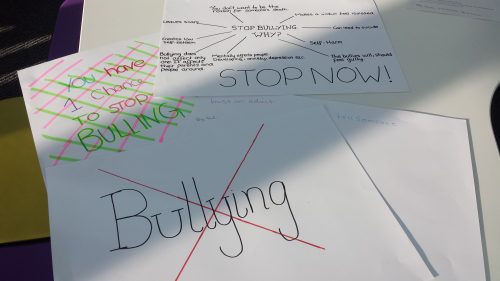Celebrating Black History Through Literature
Find out more about the issues surrounding Black History Month by exploring our display in the library featuring books on famous campaigners, activists, sports people and topics...
Filter by Category
Filter by Author











































































































































































Find out more about the issues surrounding Black History Month by exploring our display in the library featuring books on famous campaigners, activists, sports people and topics...
Posted by Teresa Turton

Year 8 students were challenged with tasks in D&T and Maths on their enrichment day on Friday 2nd October 2020. In the Design and Technology faculty, the challenge was to...
Posted by David Chalkley

Our Anti-bullying ambassadors are again busy working to make sure that all BMS students feel safe. At present they are handing out Pledges to all the CDC groups. These will be...
Posted by Helen Mateides

During our Enrichment Day last Friday, our Prince’s Trust students immersed themselves into the health and safety of working in a kitchen and all things related to making...
Posted by Suresh Varsani

It was inspiring to stand on duty and welcome students to the school on Wednesday morning this week and see the amazing home learning creations that had been made by some of our...
Posted by Jeremy Turner

This year’s Year 10 childcare class have wasted no time in stretching their learning to its fullest. During enrichment day, they spent their time laying the foundations for higher...
Posted by Rae-Anne Bowyer

This month BMS is also celebrating Black History Month by exploring the Inspiring Lives series published in The Day online newspaper. Every Friday, all CD groups read an article...
Posted by Danielle Bowe

Black History Month always provides an opportunity to celebrate black achievement and to reflect on issues affecting people of colour. Year 13 A Level History students have been...
Posted by Roger Newbold

It was superb to join Ms Fort’s talented Year 7 music class last Friday morning to see them learning all about the complexities of musical rhythmic notation and also be able to...
Posted by Jeremy Turner

As we grapple with the complexities of remote learning taking place at the same time as providing real time lessons, it was great to hear from our hugely talented and enthusiastic...
Posted by Jeremy Turner
Our Anti-bullying ambassadors are again busy working to make sure that all BMS students feel safe. At present they are handing out Pledges to all the CDC groups. These will be displayed in LRC4
What does the Pledge mean?
It is a promise and a commitment to abide by the following statements;
“I pledge not to be a bully
I will treat others with kindness and respect
I will respect that we are all different
I vow to support my friends
I vow to help stop bullying”
Why would you want to become an anti – bullying ambassador ?
 Alayna Chaudhry 08E
Alayna Chaudhry 08E
“I think being an anti-bullying ambassador is important to me because it’s something I have always wanted to do as a role and it’s something that has to be stopped around the world!”
“Being an anti bullying ambassador not only gave me the opportunity to get further into understanding the reasons and effects of bullying, but also given me the opportunity to actually help. Bullying is a widely known issue that unfortunately many people of all ages, genders and ethnicities experience. Knowing that action is taken on the matter, and that I am a part of it, is such a nice feeling. Being an anti-bullying ambassador was one of my best choices and I am looking forward to starting our activities for the new academic year.”
– Anonymous Student
Up and coming events:
Anti-bullying Week – November 16th – 20th
Cakes and Sweets on sale in LRC4 to raise Money for local charities
Some up to date statistics:
Interventions
Bullied youth were most likely to report that actions that accessed support from others made a positive difference. Actions aimed at changing the behaviour of the bullying youth (fighting, getting back at them, telling them to stop, etc.) were rated as more likely to make things worse.
Students reported that the most helpful things teachers can do are: listen to the student, check in with them afterwards to see if the bullying stopped, and give the student advice.
Do not forget – In a world where you can be anything be Kind

It was inspiring to stand on duty and welcome students to the school on Wednesday morning this week and see the amazing home learning creations that had been made by some of our...

11th – 15th of November 2019 An opportunity to Come and meet our Anti-bullying ambassadors Enter the Arts Competition: Compose a Poem, Short story Or Make a Poste E v e r...